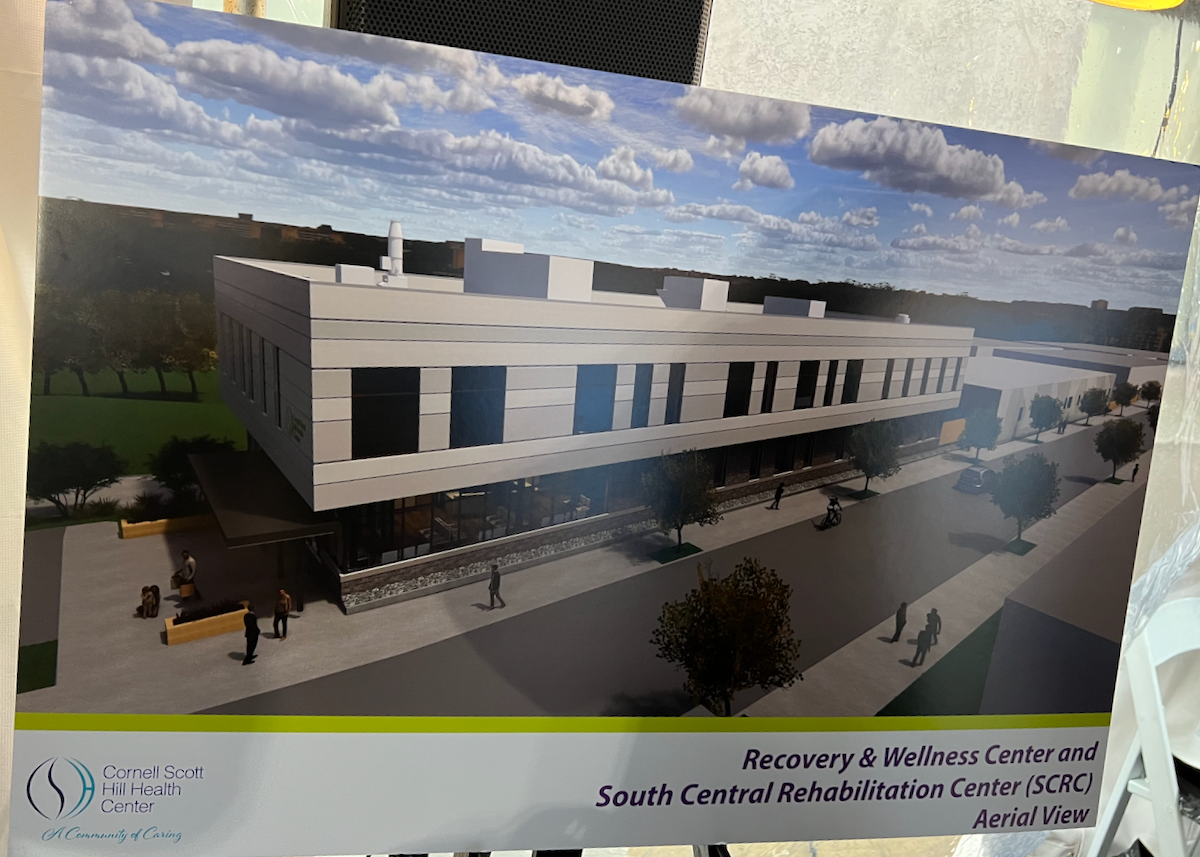
Maya McFadden Photo
At Thursday's groundbreaking on Minor St.
A community of healthcare partners and political backers gathered in the Hill to celebrate the groundbreaking of Cornell Scott Hill Health Center’s new hub for behavioral health and substance abuse services.
That was the scene Thursday at 149 Minor St., which is the construction site of the community health center’s planned new Recovery & Wellness Center (RWC).
State and local leaders broke ground on the site in the Hill neighborhood as rain showers occasionally passed overhead.
The new center is expected to have 52 short-term therapeutic living dormitories and beds for people seeking treatment for substance use disorders and mental health illnesses.

Project plan renderings.

Cornell Scott Hill Health CEO Michael Taylor.
Cornell Scott Hill Health Center CEO Michael Taylor described the planned three-story, 31,000 square foot building as a symbol of hope, change, and healing for the community.
“When we free someone from the grip of addiction, when we effectively treat other behavioral health issues and also address their medical challenges — all in a patient-centered and integrated manner — we not only make individuals healthier, we strengthen our community,” said Taylor.

Building interior rendering.

Construction site Thursday afternoon.
The building will include individual and group counseling rooms and a medical suite; a 12-bed female dormitory and 40-bed male dormitory; and an industrial kitchen and cafeteria.
Beside the new RWC is the Cornell Scott South Central Rehabilitation Center (SCRC).
The RWC is expected to open for patients by the end of 2023. The building was designed by Svigals + Partners architectural firm and construction work will be done by Newfield Construction.
The project’s estimated total cost is $24.5 million.

The lineup of speakers Thursday included Cornell Scott Hill Health Center Chairs of the Board of Directors Orlando Cordero and LindyLee Gold; Gov. Ned Lamont; Mayor Justin Elicker; Hill Health Chief Medical Officer for Mental Health and Addiction Services Ece Tek; Senior Community Investment Officer for the Corporation for Supportive Housing John Dunne; CEO of Yale New Haven Health System Christopher O’Connor; and President of the Community Foundation for Greater New Haven William Ginsberg.

Minor Street view of building.
The project leaders thanked the Hill community for its support through the 10-year process.
Several speakers declared substance abuse a crisis and Lamont described the state’s overdose rates as “stubbornly high.”
Historically substance abuse has been criminalized, Elicker said. He praised Cornell Scott Hill Health Center for “treating substance abuse disorders as a health challenge.”
“We are doing the right thing,” he added.

Ece Tek.
The addiction rehabilitation center is the brain child of Tek, who worked with Taylor to bring to life her dream of an addiction services campus, she said.
Gold emphasized the importance of Cornell Scott Hill Health Center’s services being unique by being implemented without cultural barriers for people of color. “White supremacy has contributed to these many health inequalities,” she said.
“We see it in the data, we see it in the headlines, behavioral health and substance abuse issues impact our community in countless ways,” Ginsberg said.

Cornell Scott Hill Health team.

Contributed photo